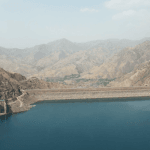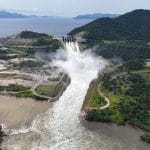ATHENS – The European Union and member states need to work together to increase energy security, which is a goal that will be continued during Romania’s six month EU Presidency.
“Yes, definitely, we need to work together on energy efficiency but also on the diversification of supplies, the security of transit routes – security, not only meaning the safety of the pipelines, which is important, but the secure flow of energy,” Romania’s ambassador to Athens, Lucian Fatu, told New Europe on January 11, when asked if energy security was high on the agenda given that Romania is a Balkan country and some countries in the region are very dependent on one supplier.
After presenting his country’s rotating EU Presidency priorities, Fatu told New Europe that energy security is an ongoing issue and what the Presidency will definitely support diversification. He noted that while energy is not a political issue, it needs political will to push the diversification projects forward.
“There is an activity where we deal with states, we deal with companies but, at the end of the day, we deal with consumers so there is a need for political will but also for investment and for strategic view on these issues,” Fatu said.
He noted that while Romania has its own resources it plans to work with Bulgaria, Greece, Serbia and other countries in the region to increase security of supply.
“We are interested in providing best opportunities and best treatment for our customers, for our consumers. But also we do it as a way of integrating countries in the EU but also connecting to countries outside such as Moldova and this is a way not only Romania but also the EU can make a difference in that country. This is an example. The same goes for Serbia,” Fatu said.
He also referred to the Romania-Bulgaria reverse-flow pipeline, which runs under the Danube River, and will allow Bulgaria to import gas from Europe.
Bulgaria, which currently buys more than 90% of its gas from Russia gas monopoly Gazprom, is also building gas pipelines with neighbouring Greece, Serbia and Turkey.
During a press conference in Athens, Fatu said earlier on January 11 that energy transit and distribution is important for the EU member states and countries in the region. “As a country, we are very much interested in working with Greece, Bulgaria and other countries in the region to ensure the best conditions for energy security, diversification of supplies – the vertical corridor as well as the IGB (Interconnector-Greece-Bulgaria),” the Romanian envoy said, adding that other regional pipelines and interconnector projects, are vital for the bloc’s energy security.
The 182-kilometre IGB Pipeline is a strategic gas transportation infrastructure providing diversification of gas supply to the Bulgarian and Southeast Europe gas market and supply security to Greece. IGB will provide a direct link between the national natural gas systems of Greece and Bulgaria with an Entry Point in the vicinity of Komotini and an Exit Point in the vicinity of Stara Zagora.
IGB can also supply gas from the planned floating storage regasification unit (FSRU) in Alexandroupolis in Greece to Bulgaria and other Balkan countries. The FSRU will further expand options for liquefied natural gas ensuring that Greece and its neighbours have multiple options, enhancing diversification and security of supply in Europe.
follow on twitter @energyinsider







